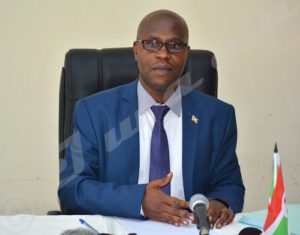Following the inaccessibility to health buildings and lack of information related to the health and reproduction domain, people living with disabilities say they face several challenges regarding the access to appropriate treatment. Adelaide Nyigina, chairwoman of the Union of People living with Disabilities in Burundi (U.P.H.B), says some buildings and installations are not appropriate for disabled people. “Buildings with stairs and some installations including delivery rooms- which are not appropriate for pregnant women living with disabilities- constitute major challenges for disabled people,” she says.

Minister Martin Nivyabandi: “Burundi government is committed to supporting people with disabilities”
She also says the Braille system- for the deaf and dumb constrains the access to the appropriate treatment. “The sender and the receiver of the message do not understand each other easily. There must be an interpreter to facilitate the communication,” she says.
The chairwoman of UPHB urges the government to support more people living with disabilities by popularizing Braille system and taking into account disabled people’s access to some Installations and buildings.
Martin Nivyabandi, Minister of Human Rights says coping with human disability is a worldwide challenge.
According to the UN survey conducted in 2011, people living with disabilities were estimated at between 15 and 20%. “Around 4, 5% of the Burundian population live with disabilities”, he says.
Minister Nivyabandi says the government has taken different initiatives to improve the living conditions of the disabled people. He says the government ratified the Convention on the rights of people living with disabilities and its Optional Protocol in 2014 and built centers for their adoption and reinsertion. “New infrastructures are erected by taking into account disabled people’s access to them,” he says.



















 IWACU Open Data
IWACU Open Data

